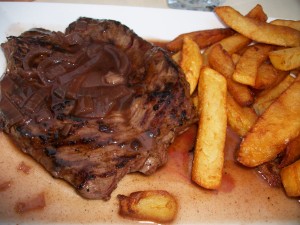Chris Christie's pronouns
According to Andrew Rosenthal ("Chris Christie: But Enough About Mitt, Let’s Talk About Me", NYT 8/29/2012):
Gov. Chris Christie is getting rave reviews today for his performance at the National Republican Convention, and there’s no doubt in my mind that he did a huge amount of good for the three most important people in his life – he, himself, and him.
Whether he did any good for Mitt Romney is less certain (and when the cameras cut to Mr. Romney in the audience, the look on his face, at times, suggested that he may have been wondering the same thing.)
The New Jersey governor was, as advertised, energetic, and combative, and played right to the heart of his constituency – err, I mean Mr. Romney’s constituency – on the far right of the Republican Party. But his speech sound more like a stump speech for himself, for re-election or for some federal office, than the keynote speech at the nominating convention for another politician.
By my count, Mr. Christie used the word “Romney” six times in his address. He used the word “I” 30 times, plus a couple of “me’s” and “my’s” tossed in for seasoning.
Read the rest of this entry »



 In "
In "